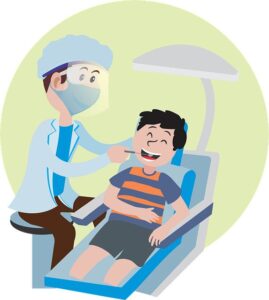You’ve been feeling unwell for some time now, and your doctor has recommended that you go to the hospital for further tests and treatment.
But just the thought of entering a hospital sends shivers down your spine. Perhaps it’s the fear of being poked with needles or undergoing surgery, or maybe it’s simply the unfamiliar environment that makes you anxious.
Whatever your reason for fearing hospitals may be, know that you’re not alone. Many people experience anxiety or fear when faced with the prospect of going to a hospital, but there are steps you can take to overcome these fears and get the care you need.
In this article, we’ll explore some effective strategies for conquering your fear of hospitals so that you can feel more confident and in control during medical visits. Whether it’s learning relaxation techniques or seeking support from loved ones, we’ve got you covered.
Acknowledging and Identifying Your Fears
 You’re probably feeling a bit uneasy right now, but it’s important to acknowledge and identify the specific things that are causing you discomfort about this situation.
You’re probably feeling a bit uneasy right now, but it’s important to acknowledge and identify the specific things that are causing you discomfort about this situation.
Understanding triggers is an excellent way to understand what it is that makes you afraid of going into hospitals. Perhaps it’s the thought of being stuck in a confined space or the fear of needles.
Once you identify these triggers, you can work on developing coping mechanisms to help reduce your anxiety. Finding coping mechanisms may seem challenging at first, but there are many strategies that can be effective in helping you overcome your fears.
It might be helpful to talk to someone who has gone through a similar experience as they could offer valuable advice and support throughout this process. Deep breathing exercises or visualization techniques can also help calm your nerves before entering the hospital.
Remember, overcoming your fear takes time and patience; it won’t happen overnight. However, by acknowledging and identifying what causes your anxiety, understanding how to manage those triggers, and finding effective coping mechanisms will help make the process less daunting for you.
With some practice and persistence, you’ll find yourself becoming more comfortable with going into hospitals over time!
Practicing Relaxation Techniques
Relaxation techniques can help you feel more at ease when preparing for a hospital visit. Visualization exercises, like imagining yourself in a calm and peaceful environment, can be helpful in reducing anxiety. You can also practice mindfulness meditation to focus on the present moment and let go of worry and fear.
To start with visualization exercises, find a quiet and comfortable place where you won’t be disturbed. Close your eyes and take deep breaths while picturing a peaceful scene, such as a beach or forest. Try to engage all your senses by imagining the sounds, smells, and sensations of that environment.
Spend several minutes in this visualization exercise each day leading up to your hospital visit.
Mindfulness meditation involves focusing on your breath and being aware of your thoughts without judgement. Find a comfortable position to sit or lie down in, then set aside 10-15 minutes each day to practice this technique.
When anxious thoughts arise, acknowledge them without trying to push them away. Instead, gently bring your attention back to your breath.
Incorporating relaxation techniques into your routine can help alleviate some of the anxiety associated with going into the hospital. Experiment with different techniques until you find one that works best for you.
Remember that it’s okay if it takes time to overcome these fears – practicing relaxation techniques regularly can make a big difference over time.
Seeking Support from Loved Ones
Don’t forget to lean on your loved ones for emotional support during this time – they can offer a listening ear and comforting presence to help ease any concerns you may have about your upcoming hospital visit.
There are many ways to involve your loved ones in hospital visits, such as having them come with you to appointments or asking them to stay with you during your recovery. Having someone by your side can make all the difference in coping with anxiety during hospital stays.
If you’re feeling nervous about going into the hospital, don’t hesitate to reach out for support from family and friends. You might find it helpful to talk through your fears with someone who understands what you’re going through.
Your loved ones can also provide practical assistance, like helping you pack for your stay or taking care of things at home while you’re away.
Remember that seeking support from others is a sign of strength, not weakness. It’s okay to ask for help when you need it, especially during challenging times like these.
So don’t be afraid to reach out – let the people closest to you provide the comfort and encouragement that will help carry you through this difficult period.
Educating Yourself About Medical Procedures and Technologies
Learning about the medical procedures and technologies involved in your hospital visit can help you feel more informed and empowered throughout the process. Researching beforehand can provide a sense of control over the situation, easing any anxiety or fear that may come along with it.
Here are four benefits of educating yourself about medical procedures and technologies:
1. It helps you understand what to expect during your hospital stay.
2. It allows you to ask more informed questions to your healthcare providers.
3. It enables you to make better decisions regarding your own health care.
4. It helps reduce feelings of uncertainty and fear.
Importantly, asking questions is key to understanding these procedures and technologies fully. Don’t hesitate to ask anything that comes into mind, even if it seems trivial or insignificant at first glance. Your healthcare provider is there to help guide you through this process, so take advantage of their expertise.
By educating yourself on medical procedures and technology before going into the hospital, you’ll be more prepared for what’s ahead, making the experience less overwhelming overall.
Trust in yourself and take comfort in knowing that knowledge is power when it comes to taking control over both your physical and emotional well-being during this time.
Taking Small Steps Towards Confronting Your Fear
You can start by taking small steps towards facing your worries and feeling more in control of your hospital experience. Gradual exposure is a great way to do this.
You could begin by visiting the hospital, walking around the entrance, and getting used to the environment. Then, you could progress to sitting in the waiting room for a short period of time.
Another technique that can be helpful is positive self-talk. This involves consciously replacing negative thoughts with positive ones.
For example, instead of thinking ‘I’m terrified of hospitals,’ try saying something like ‘I am safe and in good hands at the hospital.’ This can help to reduce anxiety and make you feel more confident about dealing with medical procedures.
Taking these small steps may seem daunting at first, but it’s important to remember that each step brings you closer to overcoming your fear.
By gradually exposing yourself to the hospital environment and practicing positive self-talk, you’ll feel more comfortable when it comes time for medical procedures or appointments. Remember that it’s okay to ask for support from friends or family if needed, as they can provide encouragement along the way.
What are some common medical procedures that can cause anxiety in patients?
If you’re feeling anxious about undergoing a medical procedure, you’re not alone. Common procedures that may cause anxiety in patients include blood tests, MRI scans, and surgeries.
However, there are cognitive strategies and relaxation techniques that can help alleviate your fears. Cognitive strategies involve changing negative thoughts into positive ones by reframing the situation in a more balanced way. Relaxation techniques, such as deep breathing exercises or progressive muscle relaxation, can also help calm your nerves before the procedure.
Remember to communicate with your healthcare provider about any concerns you have and ask for additional support if needed.
How can hospitals accommodate patients with anxiety or phobias?
Imagine walking into a hospital and feeling like you’re walking into a haunted house. That’s how anxiety can feel for some patients. But hospitals are taking a patient-centered approach to create calming environments and accommodate patients with anxiety or phobias.
Designing calming environments involves creating spaces that evoke feelings of peace, safety, and security. This includes natural lighting, soothing colors, comfortable furniture, and artwork that promotes relaxation.
Additionally, staff members are trained to use calming language and techniques to help patients feel more at ease during their visit. Patient-centered care goes beyond just treating the illness but also providing emotional support to improve the overall experience for the patient.
What are some alternative therapies or treatments for anxiety related to medical procedures?
To help manage anxiety related to medical procedures, there are a variety of mind body techniques and herbal remedies available. Mind body techniques such as hypnosis, meditation, deep breathing exercises, and progressive muscle relaxation can be effective in calming the mind and reducing overall feelings of anxiety.
Additionally, herbal remedies like chamomile tea or lavender essential oil can have a soothing effect on both the mind and body. It’s important to talk with your healthcare provider before trying any new therapies or treatments to ensure they’re safe for you.
Are there any support groups or online resources specifically for people with a fear of hospitals?
Online communities and therapy options are available for people with a fear of hospitals. According to a recent survey, 40% of people who have undergone medical procedures experience anxiety related to the hospital environment.
This statistic highlights the importance of finding support when dealing with this common issue. Online communities can provide a safe space for individuals to share their experiences and find comfort in knowing they’re not alone.
Therapy options such as cognitive behavioral therapy (CBT) can also be effective in addressing the root causes of hospital-related anxiety. It’s important to seek help and know that there are resources available to overcome this fear.
Can medication be used to alleviate anxiety related to medical procedures, and what are the potential side effects?
Medication can be effective in alleviating anxiety related to medical procedures, but it also carries potential side effects. Anti-anxiety medications like benzodiazepines and beta-blockers are often prescribed for this purpose, but they can cause drowsiness, confusion, and even addiction.
Additionally, alternative therapies such as cognitive-behavioral therapy and relaxation techniques have shown benefits without the drawbacks of medication. It’s important to discuss all options with your healthcare provider to determine the best approach for managing your anxiety.
Overcoming your fear of going into the hospital is possible with the right mindset and support.
Remember that acknowledging and identifying your fears is the first step towards conquering them. Don’t hesitate to seek help from family and friends who can provide you with emotional support during this challenging time.
Don’t forget to practice relaxation techniques such as hypnosis, deep breathing exercises or meditation to help alleviate any anxiety you may feel.
Finally, take small steps towards confronting your fear by educating yourself about medical procedures and technologies ahead of time. As the old adage goes, “knowledge is power,” and being well-informed can make all the difference when it comes to reducing your apprehension about going into a hospital.





